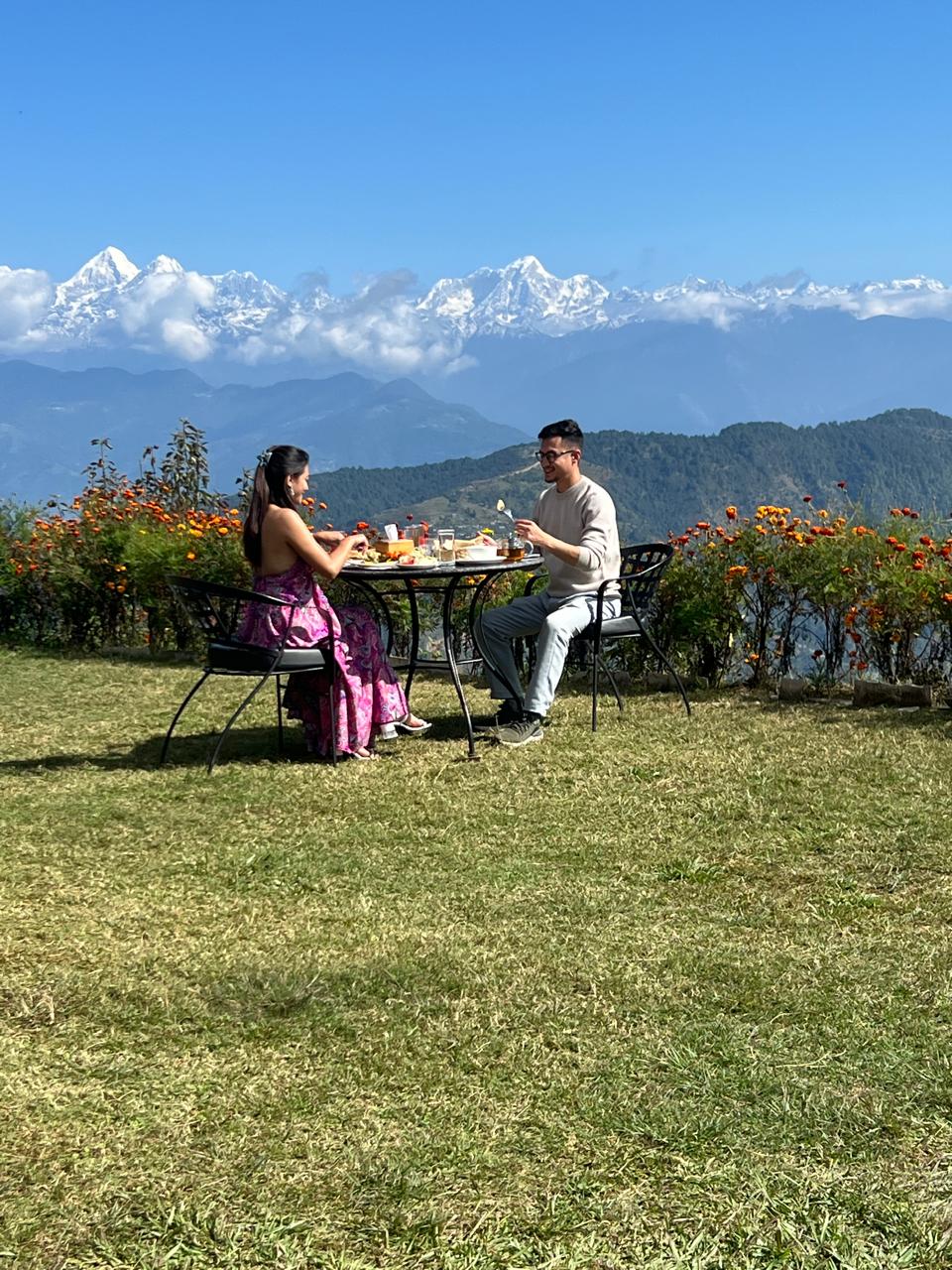Kathmandu, August 16, 2025
A big thank you to Prakriti Resort & Organic Farm for the beautifully organized press conference at the Nepal Tourism Board on their Travelife Gold Certification - a proud milestone in sustainable hospitality aligned with UN Tourism and Global Sustainable Tourism Council (GSTC) principles.
As a gesture of appreciation, Prakriti Resort offered complimentary stay coupons to all attending media representatives during the press conference. This wasn’t just a token of gratitude - it was also an invitation for them to personally witness and validates the resort’s regenerative efforts on the ground. Inspired by their commitment to sustainability and regenerative practices, we planned our visit last weekend to their property, located in the serene village of Haibung, Melamchi, in Sindhupalchok district.
We journeyed by a jeep, taking the scenic route through Sankhu and Bajrayogini Temple. The off-beat road stretched for around 12 kilometers and the entire trip took us approximately two hours. As we approached the destination, we caught our first glimpse of the resort from about half a kilometer away, nestled on a large hillock in Hille Bhanjyang. At first, we were unsure if we had arrived at an indigenous village.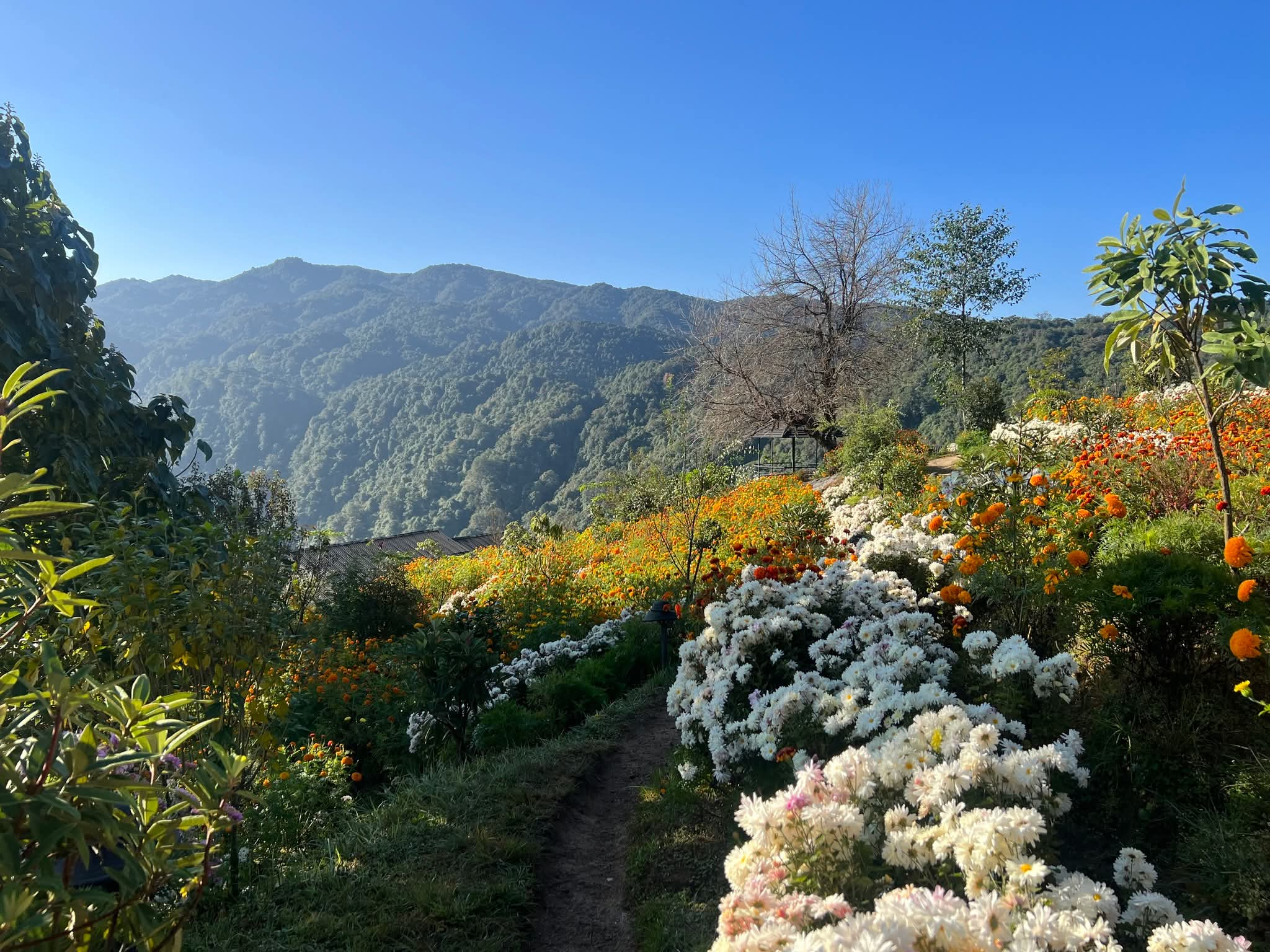
The scattered houses, surrounded by trees and farmland, and the fluttering white prayer flags on every corridor evoked a feeling of celebration, authenticity, and peace. Upon confirmation, we proceeded to the resort’s spacious parking area and parked our Jeep. The resort’s layout is breathtaking-facing east, north, and south, and surrounded on two sides by the emerald greenery of Shivapuri Nagarjun National Park. To the east lies the scenic Melamchi Valley, with tea plantations cascading into the distance.
Entering through the main gate, marked by a towering rhododendron tree, we walked toward the reception. There, we were warmly welcomed by Ms. Manisha Gurung, a local resident of Haibung and the resort’s receptionist. While sipping on a refreshing welcome drink made from a blend of farm-fresh vegetables, Manisha briefed us on our stay. She provided an overview of the rooms, farm activities, places to visit and responsible tourism practices. Impressively, the resort had already shared a beautifully curated pre-arrival information package that outlined guest responsibilities and what to expect-an excellent gesture reinforcing their sustainability ethos.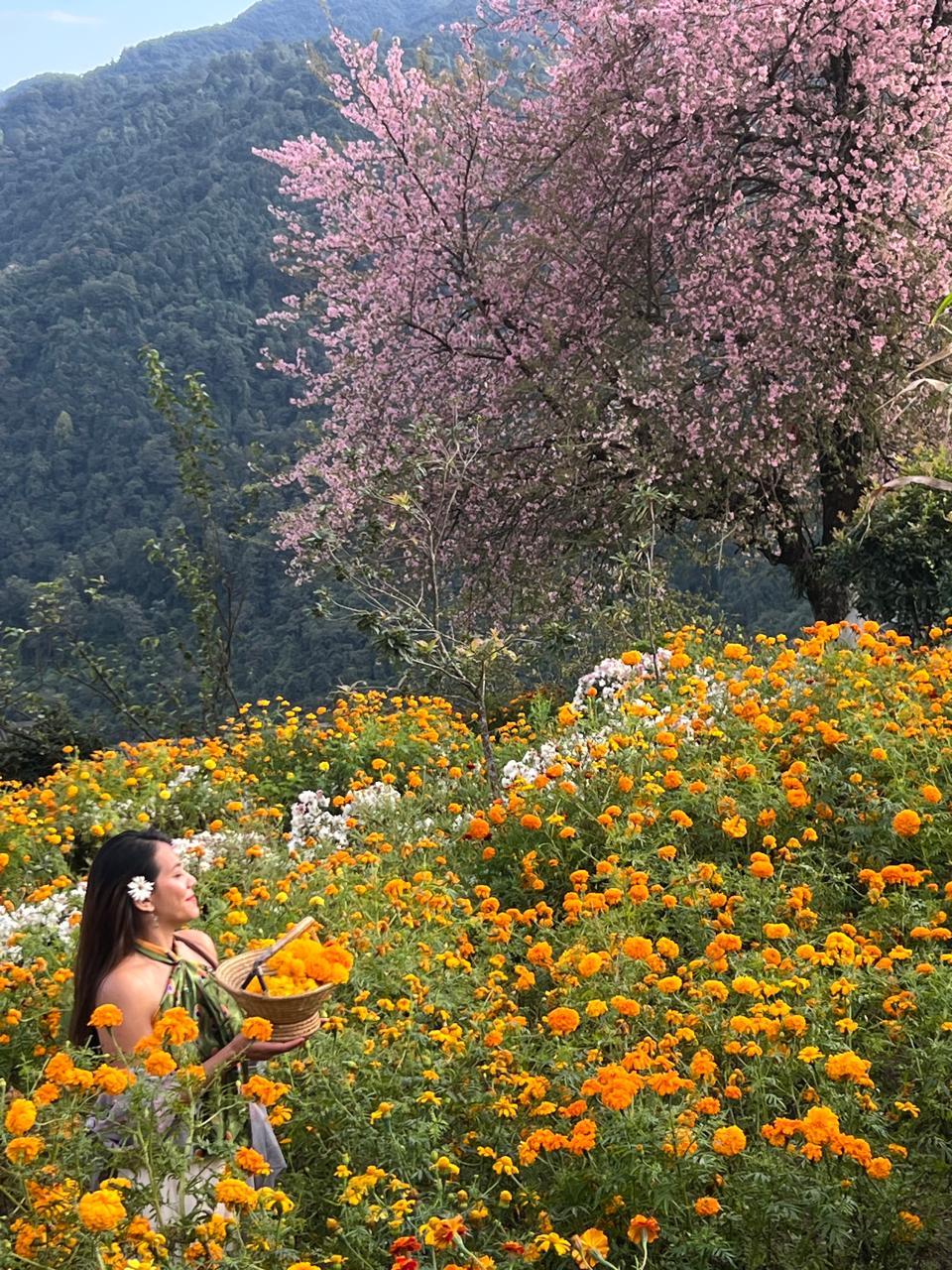
We were then guided to the dining hall, which is harmoniously designed to blend with the natural surroundings.The main building, constructed from carved local stone with a black roof, reflects the traditional architectural style of Nepal’s hinterlands. Upon entering the dining hall, we were warmly welcomed by Mr. Prem Giri, the resort in-charge, whose hospitality far exceeded our expectations. The warmth in his words felt poetic-like flowers flowing with every sentence.
The interiors are a visual delight-featuring high ceilings adorned with a massive hand-crafted bamboo chandelier, mud walls imbued with natural textures and fragrances, and decor that showcases local identity. Not a single element in the décor felt generic or commercially sourced from Kathmandu markets. Every piece was handcrafted-either by the resort’s own team or local artisans from the surrounding community. The result is a truly unique and authentic atmosphere that resonates with the values of regenerative tourism.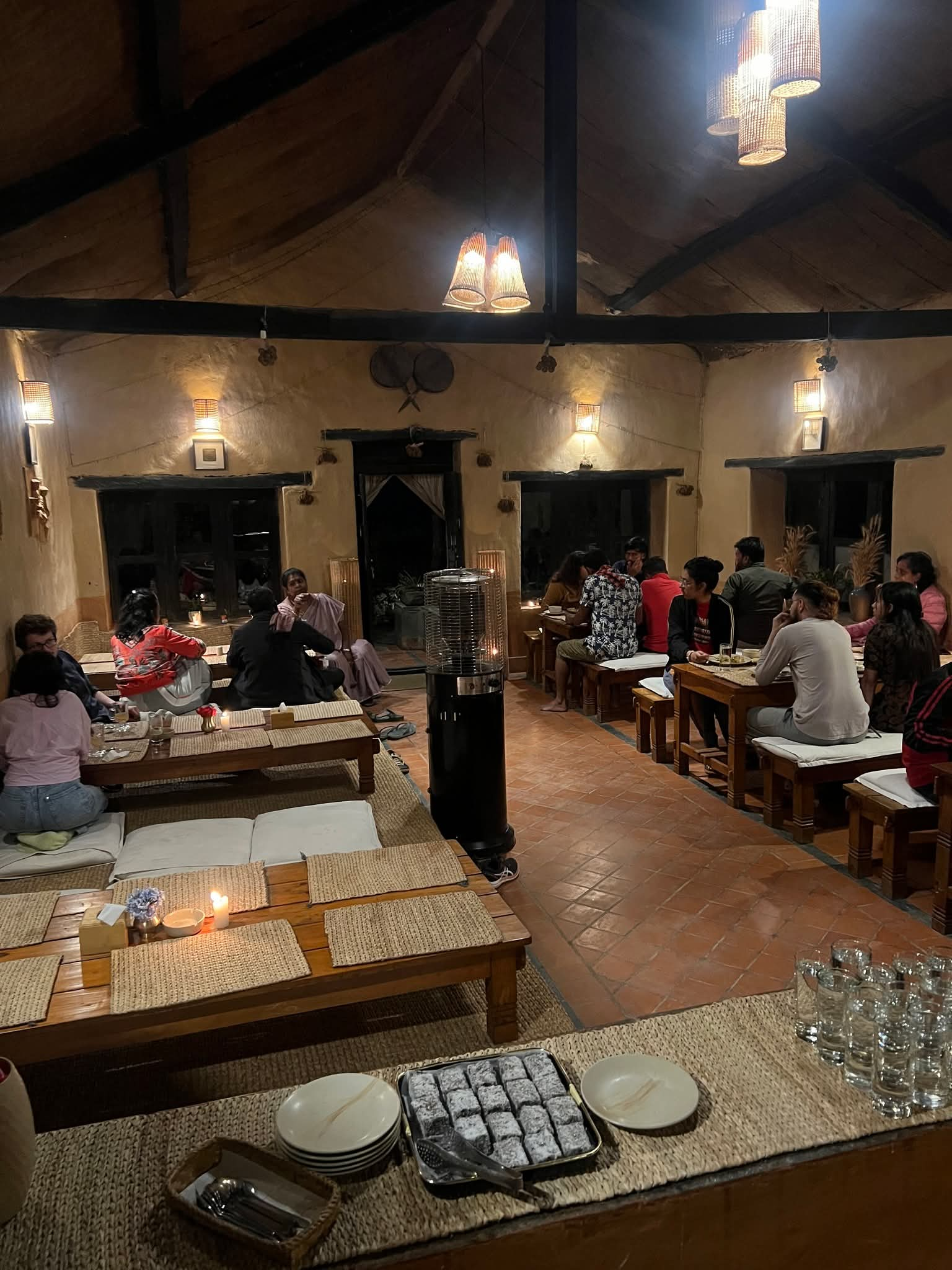
Soon after, welcome refreshment was served, beautifully presented on a leafy plate with a bamboo spoon. The dish featured a wholesome mix of fresh farm green corn, soybeans, vegetable fritters, chicken nuggets, and crispy potatoes-most of which were sourced directly from the resort’s own organic farming system. After enjoying our meal, we checked into our rooms and took some time to relax. The guest rooms are housed in elegant wooden structures built with straightly cut planks and topped with sleek black roofs-reflecting both craftsmanship and high design value.
Inside, the rooms are spacious and tastefully decorated. The walls are painted in calming, earthy tones, complemented by wood-paneled sections that lend a warm, natural ambiance. Solid wooden furniture, hand-woven rattan light shades with soft lighting effects, and floors carpeted with Sukul (traditional straw mats) blend beautifully to create a cozy yet refined aesthetic.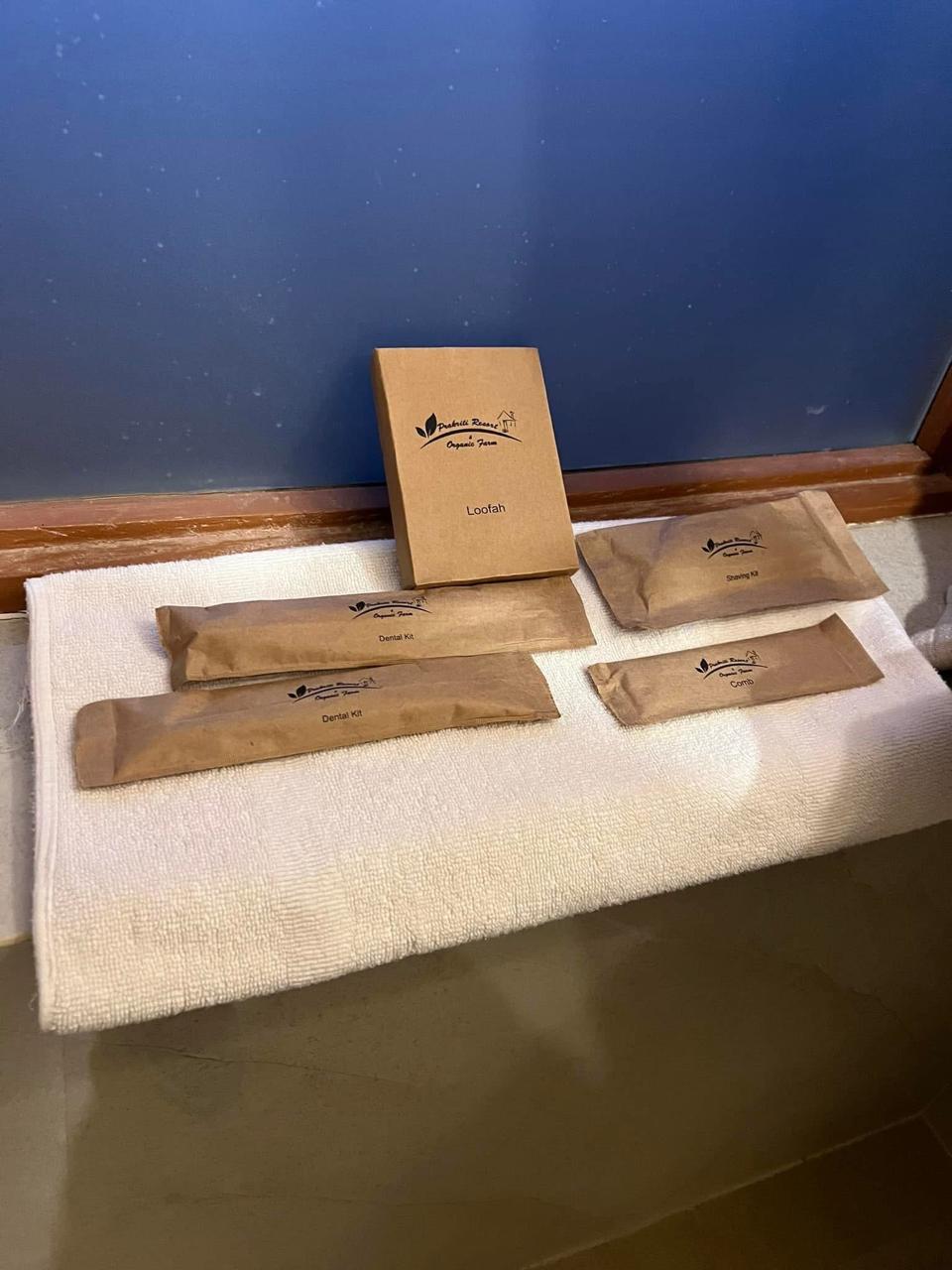
The bathrooms are spotlessly clean and well-equipped, featuring solar-heated water and amenities like natural shampoo and hand wash made from bioenzymes produced by SAKAL.
There’s a complete absence of single-use plastics. Instead, biodegradable bin liners, bamboo toothbrushes, and paperwrapped toothpaste from Bamboo Bazar are thoughtfullyprovided. https://thebamboobazar.com/ Even the drinking water is kept in reusable glass jugs, reinforcing their ecoconscious values. Room amenities include a kettle with a curated selection of teas, coffee, and homemade cookies adding to the feeling of thoughtful hospitality.
Each room opens onto a private balcony with comfortable seating, offering spectacular views of the Shivapuri forest, Melamchi valley, and on clear days the distant Himalayan peaks. Though we weren’t able to participate in many activities due to the light rain and misty weather, we simply sat back, mesmerized by the shifting clouds. The view would suddenly open wide to reveal breathtaking panoramas, only to be gently veiled again by drifting fog. It was a peaceful, meditative experience-perfectly in tune with the serene energy of Prakriti Resort.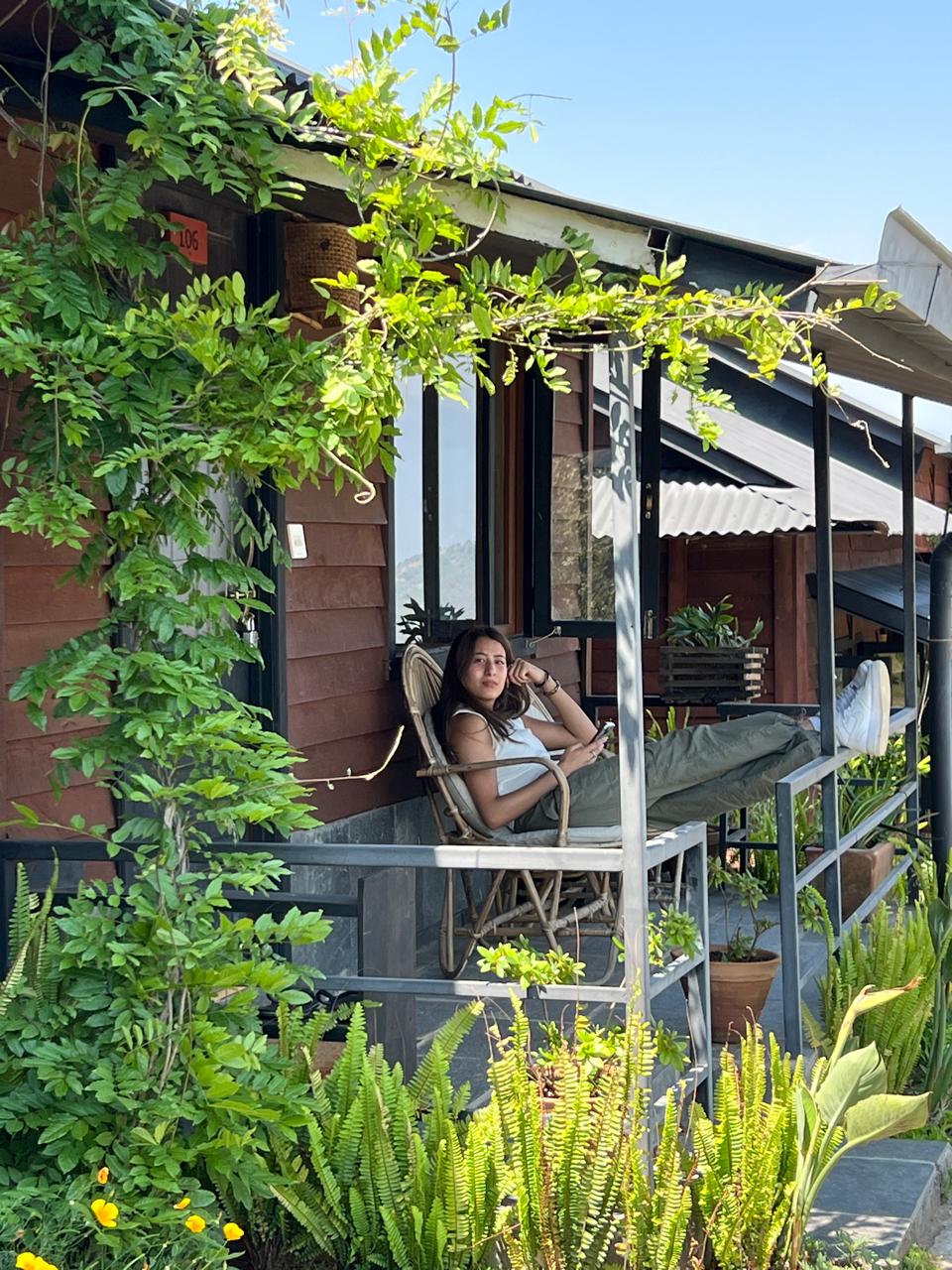
Being the monsoon season, there were fewer flowers in bloom-but one can easily imagine the vibrancy of the peak season, when the gardens are filled with abundant marigolds, chrysanthemums, and a variety of fruits like strawberries, kiwis, apples, as well as a wide range of vegetables. The garden at Prakriti Resort is beautifully curated, blending wild and ornamental plants in harmony. It’s no surprise that the resort is widely known for its rich, expansive, and biodiverse garden landscape. As evening fell, we returned to the dining hall. While our eyes wandered across the hall, admiring its rustic charm and the cozy fireplace, we were greeted by Mr. Arun Shrestha-the visionary founder and mastermind behind Prakriti Resort & Organic Farm.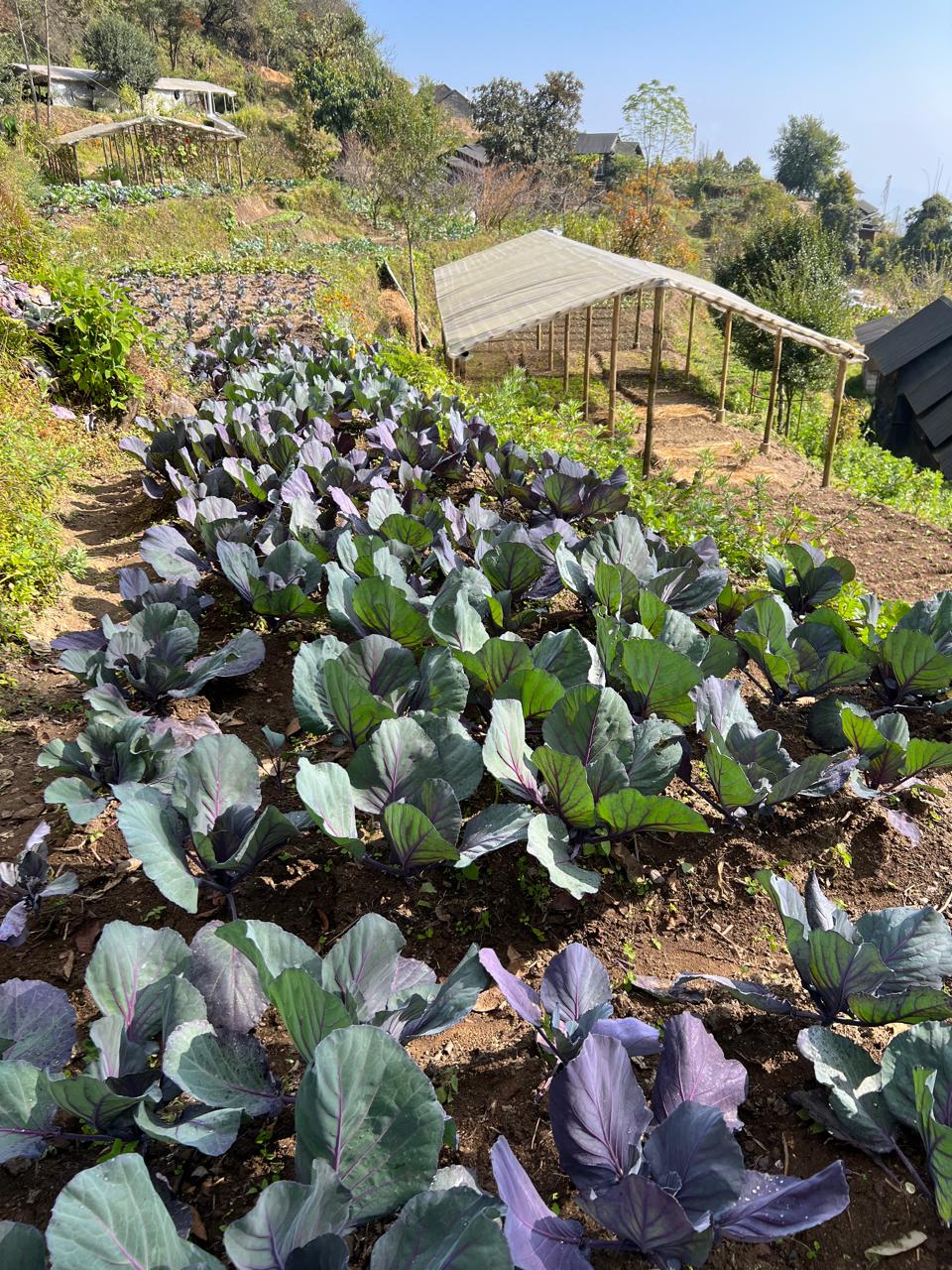
To add warmth to the moment and spark conversation, Arun graciously offered us a local drink accompanied by locally sourced trout fish & snacks, while the fireplace crackled to life. It felt like the perfect setting-and the perfect person-to dive deeper into the story behind the resort’s recent Travelife certification. With Arun present, we found ourselves in the ideal space to explore the values, principles, and practical applications of sustainability being implemented right before our eyes.
A Journey Routed in Regeneration Tourism:
Arun narrated his journey which began more than four decades ago at Dhulikhel Mountain Resort, where the founder first immersed himself in the world of hospitality and began to understand the deeper essence of place-based tourism.It was his father, Vishnu Shrestha-a visionary and true pioneer-who introduced the concept of a resort to Nepal. His foresight and dedication laid the foundation for what would become a lifelong calling. Those early lessons shaped the values that continue to guide him today. Further, this path later led him to lead the Nepal Environment and Tourism Initiative Foundation (NETIF), Suomen Latu, a Finnish-supported project (www.netifnepal.org) that became a turning point. Over six years, he gained
valuable insight and forged deep connections with communities-an experience that left a lasting impact.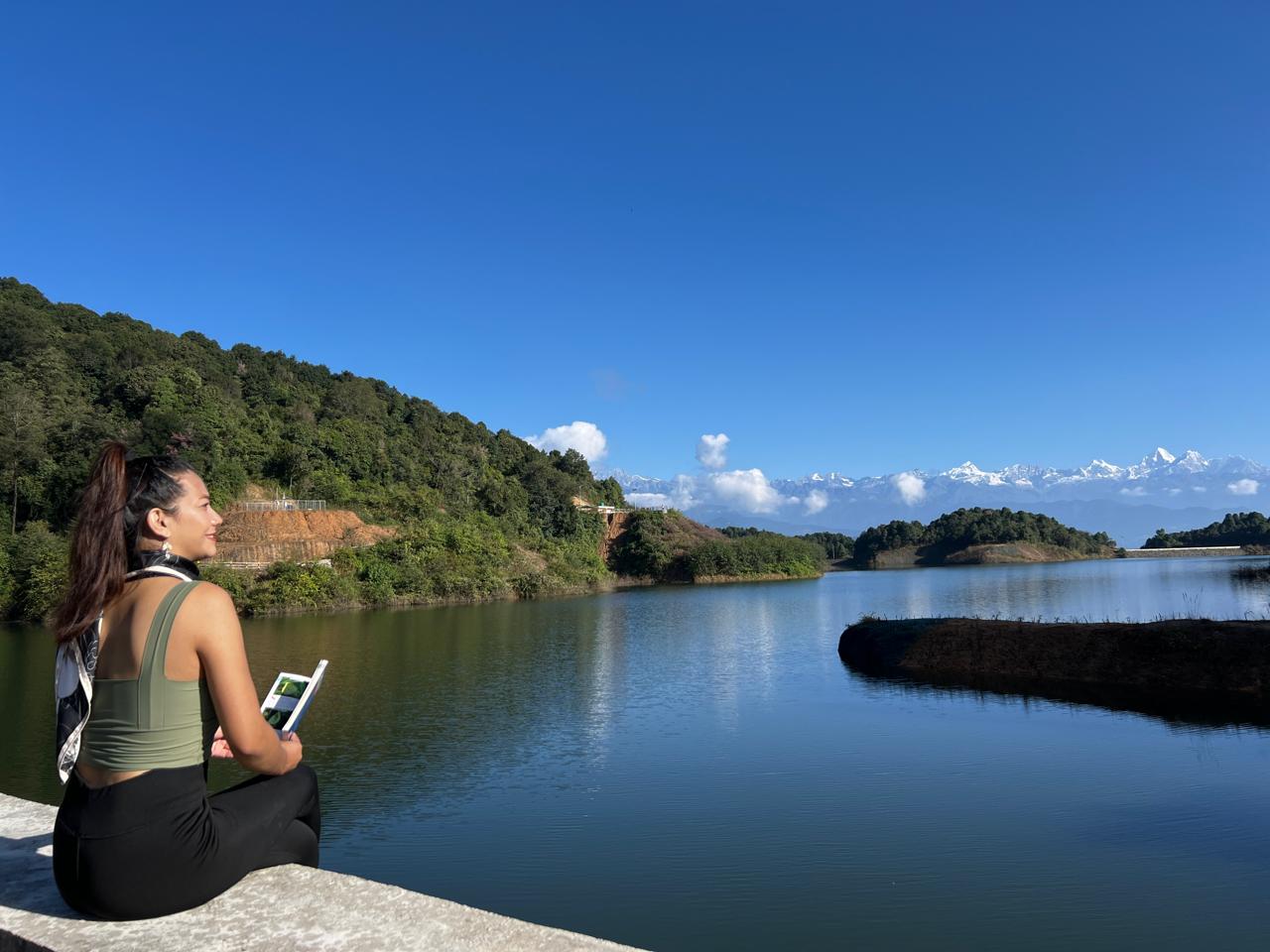
That chapter eventually manifested and gave rise to Prakriti Resort & Organic Farm-a labor of love and purpose where all his knowledge, experiences, and ideals could take root. Starting from scratch in Haibung, Melamchi Municipality, he and his team worked tirelessly for over twelve years to shape the land,personally designing every eco-conscious structure and nurturing a living farmthat would honor both people and the planet. He was joined by trusted colleagues from Dhulikhel Mountain Resort and committed local community members from Haibung, whose belief in the vision brought it to life.Without large investors or corporate funding, the project grew through determination, teamwork, and the unanticipated strength of social media, which became the resort’s lifeline in reaching guests and staying afloat through uncertain times.
Every rupee earned was reinvested into the land. The team expanded the farm, introduced new guest facilities, and stayed grounded in their environmental values. It wasn’t about luxury only -it was about authenticity, progress, and soul, built sustainably and slowly. Then came a moment that brought everything full circle.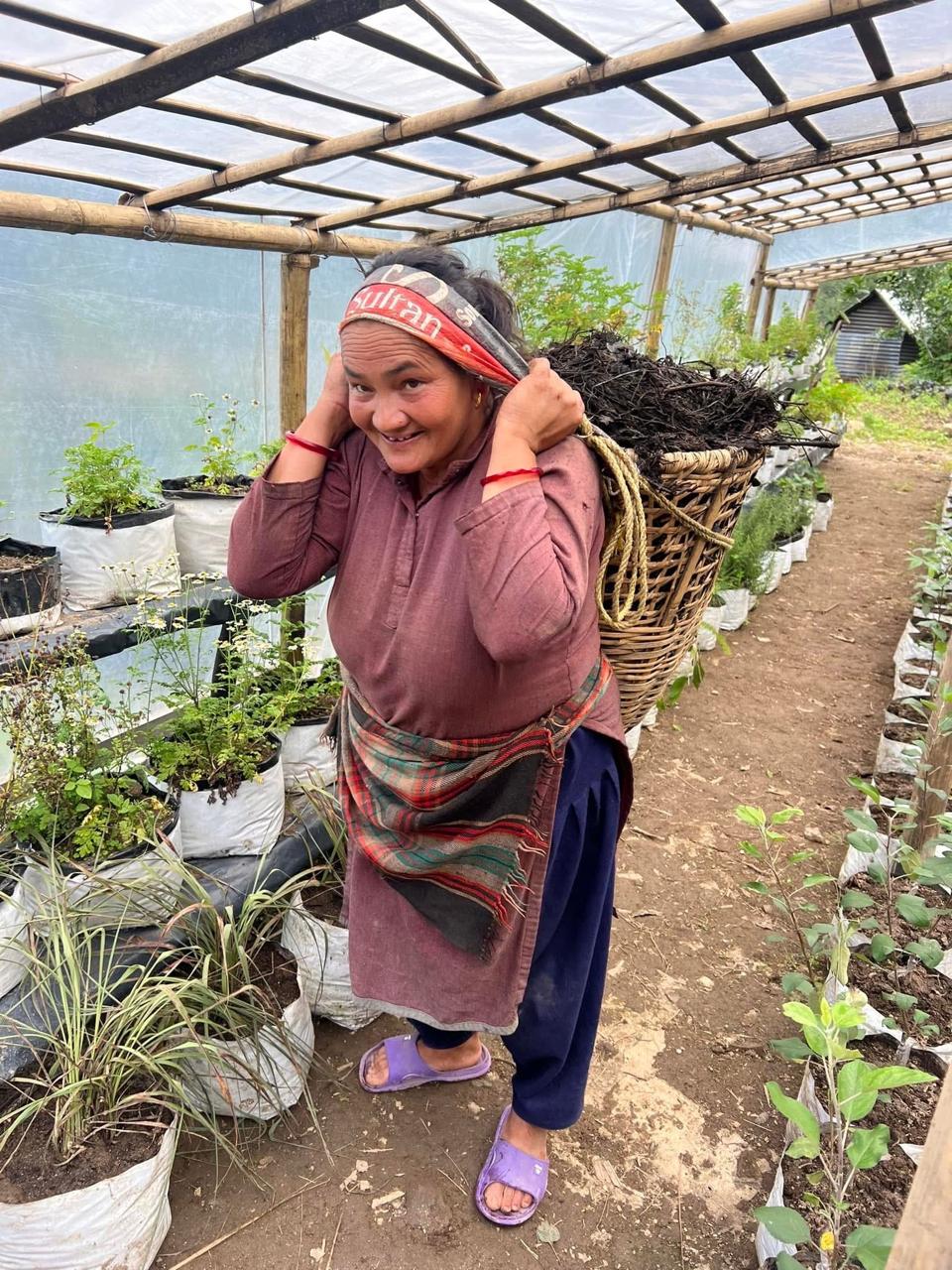
Significances of Sustainable Tourism
Arun began by sharing the significance of sustainable tourism and the four core principles that guide Prakriti Resort’s practices. He explained how each of these values are deeply embedded in the resort’s operations and how they are measured and aligned with recognized sustainability standards. As he briefly outlined the resort’s journey toward achieving sustainability certification-a process that took nearly a year fulfilling all 143 standards and criteria’. Arun emphasized that the certification was not just a checklist, but a reflection of a process and long-standing commitment.
Beyond Sustainability and Living the Regenerative Ethos
Before delving deeper, Arun made it a point to distinguish between sustainable and regenerative tourism. Regenerative tourism goes beyond minimizing harm to actively restoring and revitalizing the ecological, cultural, and social systems upon which tourism depends. In the face of accelerating climate change, biodiversity loss, and cultural homogenization, the central question for tourism is no longer whether to be sustainable-but how to be regenerative. He explained that while sustainability often focuses on minimizing harm, regeneration goes a step further by actively contributing to the healing and flourishing of both people and the planet.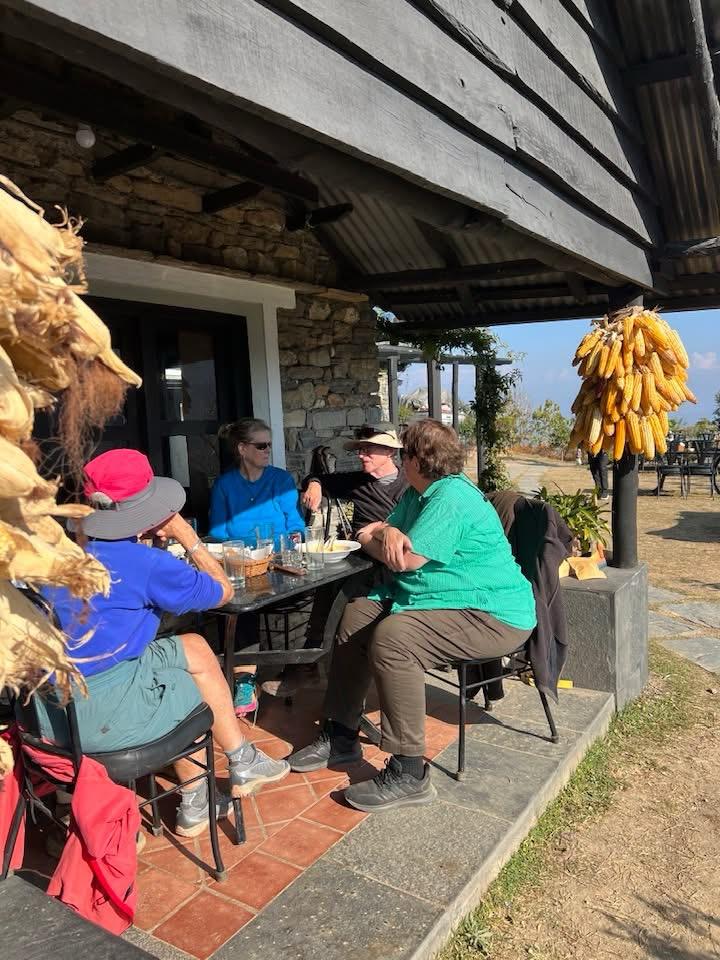
At Prakriti Resort, this philosophy is not just a concept but a living, working practice embedded in every aspect of its design, daily operations, and guest experience. Arun highlighted that the resort doesn’t merely comply with sustainability principles-it fully embraces a regenerative mindset to uplift the environment, nurture local culture, foster meaningful cultural immersion, and promote the social well-being of its guests and the surrounding community.
Healing the Land and Nourishing the Soul through Organic farming
A central pillar of this regenerative approach, he shared, is the integrated organic farming system developed over more than a decade on-site, completely free from chemical inputs and designed to work in harmony with natural ecosystems. The resort’s land has been cultivated using traditional and natural methods that restore soil health, enhance fertility, and support biodiversity. Beyond its ecological benefits, the organic farm directly complements the hospitality market by supplying fresh, healthy, and seasonal produce for guests, reinforcing the connection between food, wellness, and place.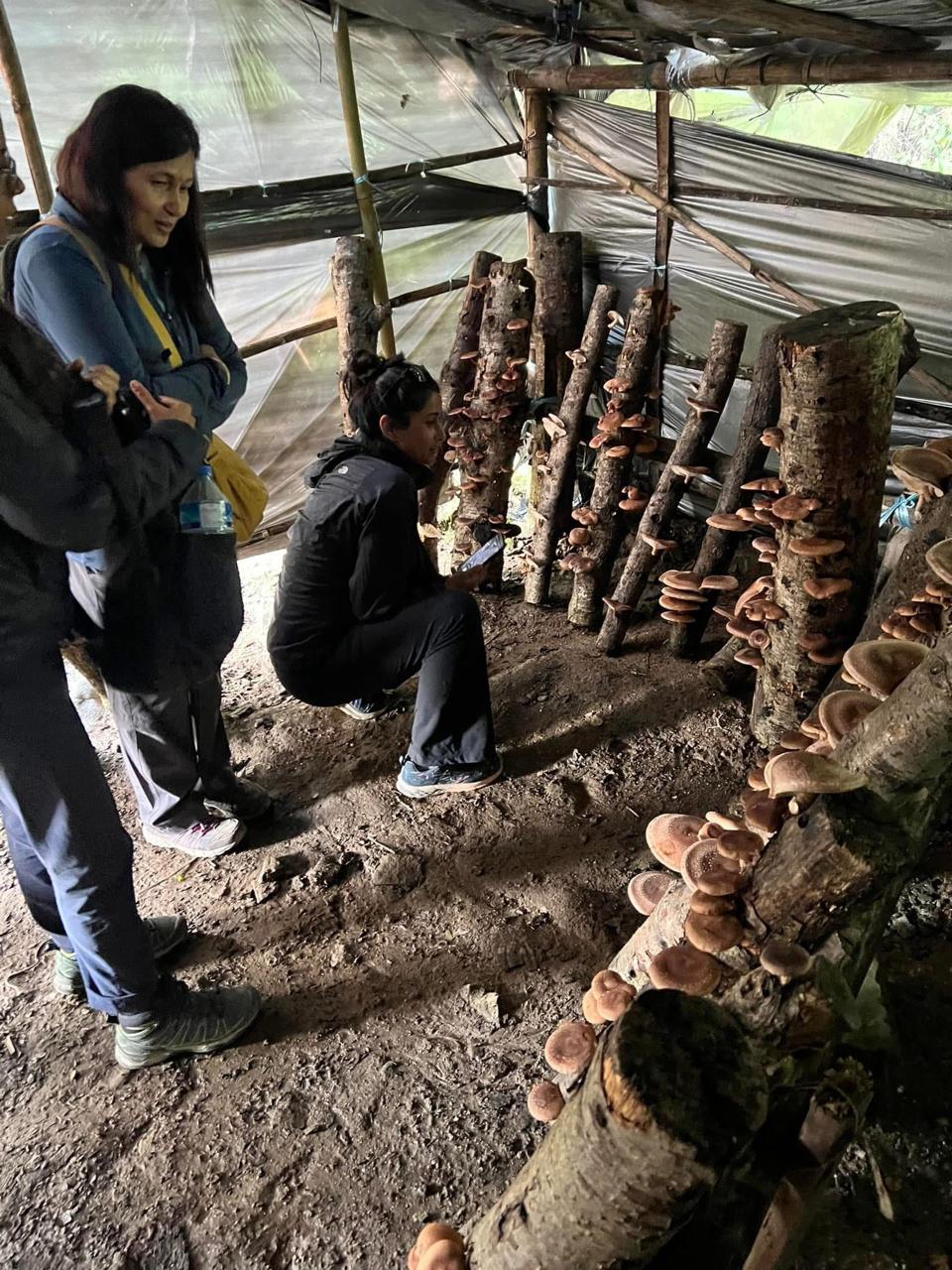
It also plays a vital role in reducing emissions by eliminating long supply chains, while integrated waste management practices-such as composting and recycling-further minimize the resort’s environmental footprint. Moreover, the farm serves as a source of meaningful employment for local villagers, creating livelihoods rooted in sustainability and pride. The farm, he noted, is also a center for indigenous seed preservation and research. By growing and experimenting with indigenous and heirloom varieties of grains, vegetables, and herbs, the team contributes to seed sovereignty and the revival of native plant knowledge that is slowly disappearing.
This not only helps conserve biodiversity but also connects communities and guests with food heritage and resilience. Arun described this as a subtle but powerful way of building awareness: guests not only taste what’s grown locally, but they see and understand where it comes from and the regenerative effort behind it.
Zero Waste Philosophy to Designing a Circular Ecosystem
Arun emphasized that their commitment goes beyond chemical-free farming; it’s about healing the land, regenerating native ecosystems, and cultivating harmony between cultivated and wild spaces. Arun also spoke about the resort’s strong commitment to zero-waste practices as a core component of its regenerative philosophy. The resort has developed an integrated waste management system that responsibly handles both biodegradable and non-biodegradable waste. Waste is separated, reused, composted, or creatively repurposed. Kitchen vegetable and fruit scraps, along with other farm bio products, are either composted or used as nutritious feed for the resort’s cows-closing the loop between food production and livestock.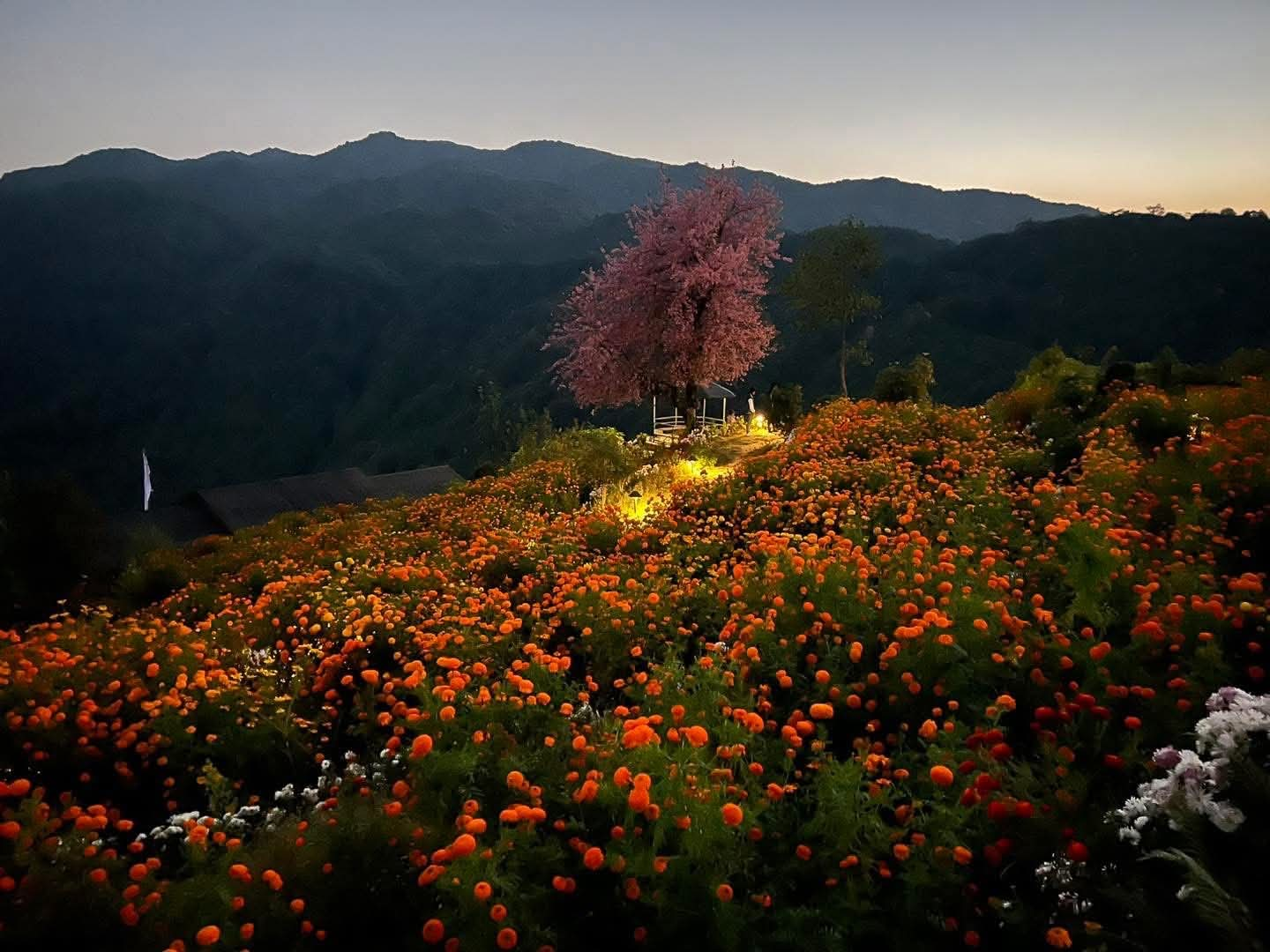
Organic waste is composted and returned to the farm to nourish the soil, while recyclables are processed through Kathmandu waste networks.No waste is burned or dumped into the natural environment-every material is either reused or responsibly managed, supporting a circular economy model that contributes meaningfully to global climate change mitigation. By weaving together organic farming, biodiversity conservation, zero waste living, and community co-creation, Prakriti Resort demonstrates what it means to go beyond sustainability.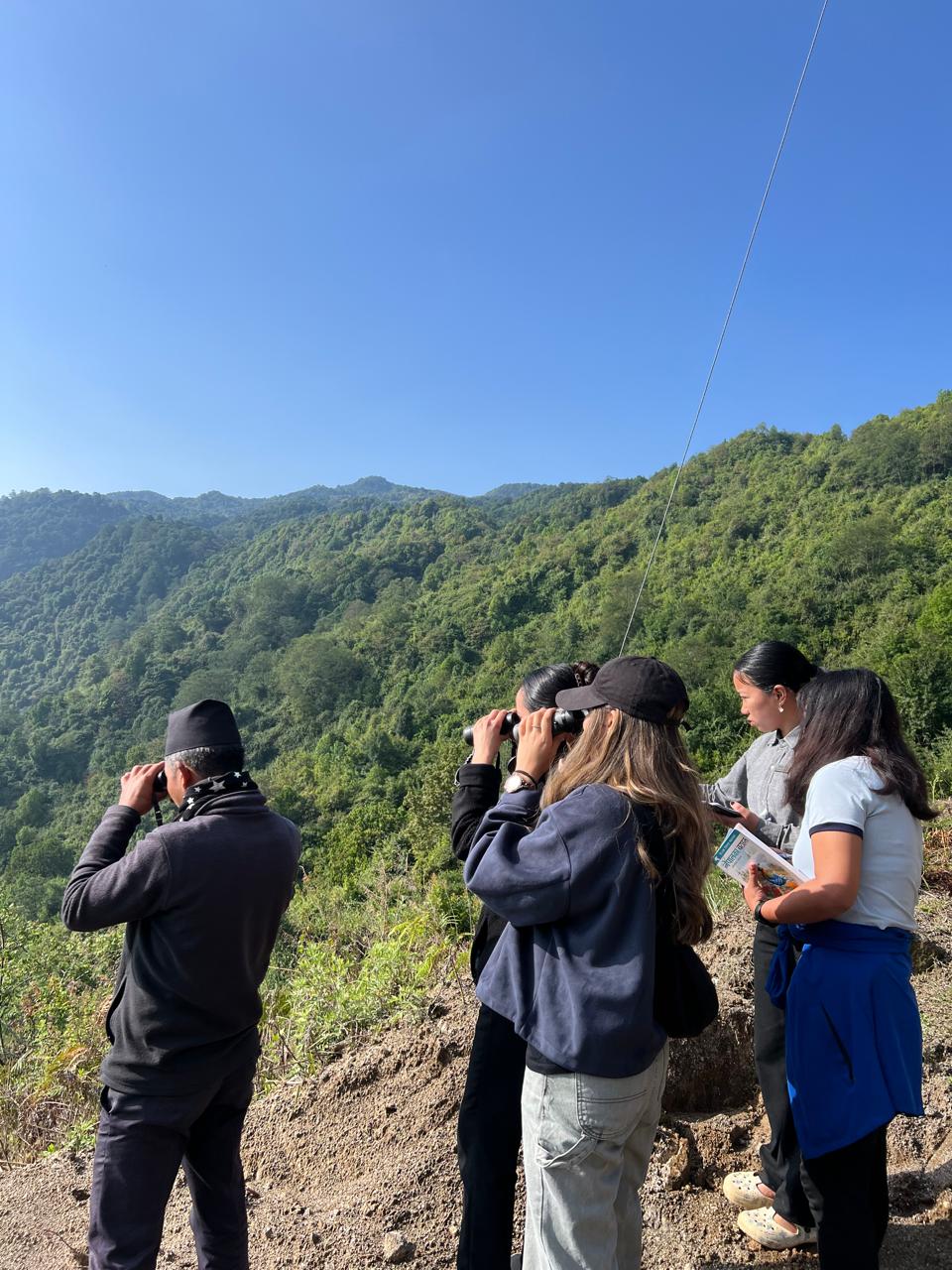
Equally important to Arun is the complete eradication of chemical use across all resort operations-not just in organic farming but also in daily hospitality services. In partnership with SAKAL , the resort has successfully transitioned to non-toxic, biodegradable cleaning, toiletries and personal care products. Bioenzyme-based dish wash, hand wash, and shampoo are now used throughout the property, ensuring that no harmful chemicals enter the soil, water, or food systems.
These decisions, Arun emphasized, are not just about guest health but also about protecting the surrounding ecosystem and supporting climate resilience. Single-use plastics have been entirely eliminated from the supply chain, replaced by sustainable alternatives like bamboo-based amenities, jute bags, glass containers and biodegradable bin liners from Net Zero. Packaging is minimized wherever possible; any unavoidable plastic packaging received from suppliers is carefully sorted and handed over to “Khalkis”https://www.khaalisisi.com/, the resort’s waste management partner.
Arun further elaborated on the resort’s on-site waste-water Natural Treatment System, which are designed to ensure the safe and natural reuse of both blackwater and grey-water. All kitchen wastewater first passes through grease- trap to remove oils and solid solids, and is then treated in a constructed wetland system planted with Canna lilies and other bio-filtration species.
This purified water is reused in farming or safely discharged into the environment, preventing pollution and conserving freshwater resources. Fecal sludge from shared toilets is treated using the award-winning Sulabh method from India.
Even urine is collected and stored separately to be transformed into organic fertilizer naturally rich in nitrogen, phosphorus, and potassium (NPK). Grey-water from guest showers and sinks is directed to irrigate garden spaces,while black-water is managed through individual soak pits. Arun views these systems not as waste disposal mechanisms, but as regenerative solutions that complete the natural cycle of nutrients. All of these projects-including wastewater and fecal sludge treatment-have been developed in close collaboration with ENPHO, contributing not only to environmental health but also to climate action through ecological design and circular resource management.
Resort’s Architecture, Design and Decors
The resort’s eco-friendly architecture and design further reflect its regenerative ethos. All buildings are constructed using natural materials like stone, wood, and mud, with designs that draw inspiration from traditional Gurung village aesthetics.The interiors are decorated with handcrafted elements made by local artisans and the resort team themselves, using locally sourced or repurposed materials. Every corner tells a story-not just of style, but of sustainability and community connection.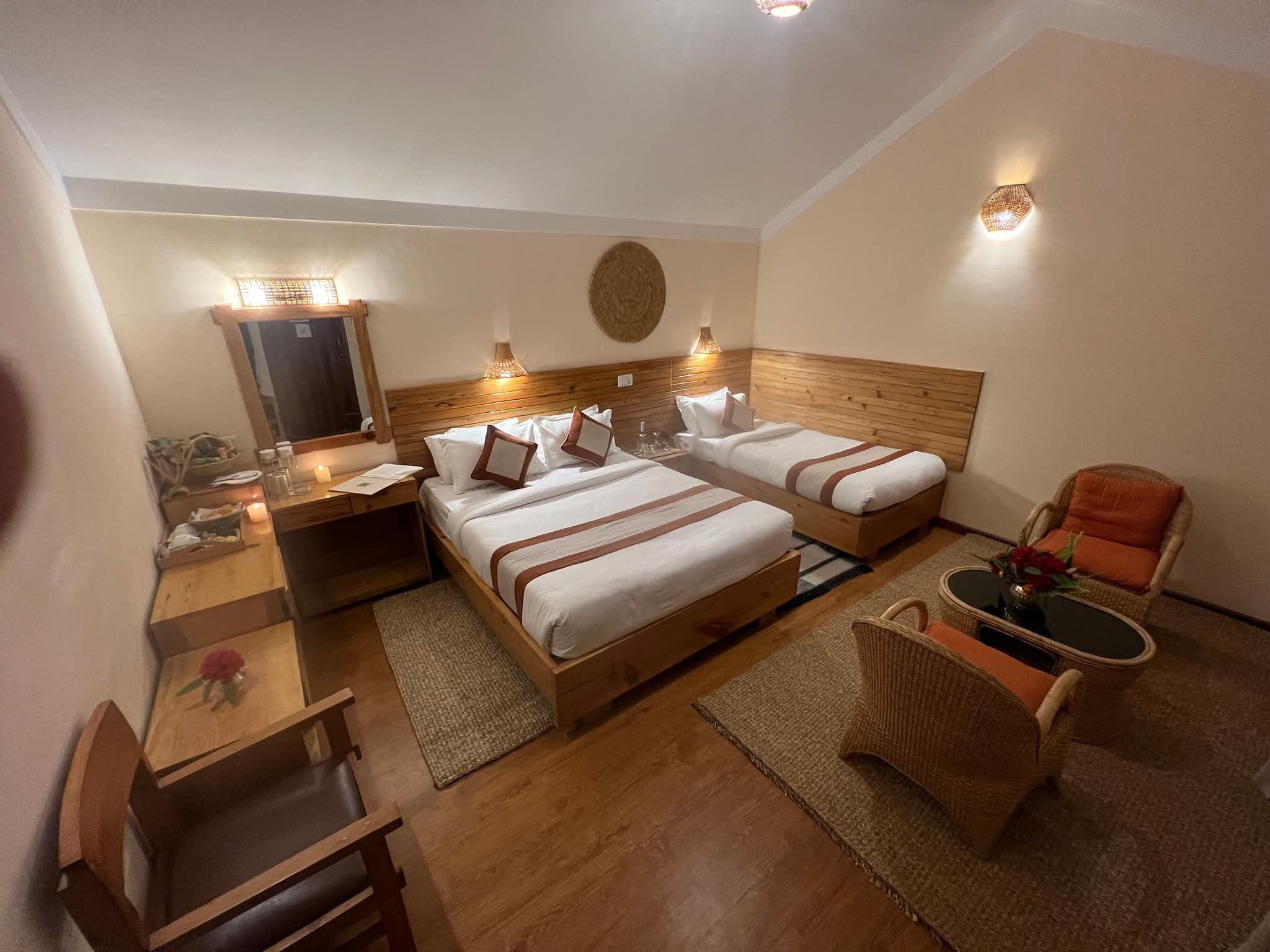
Energy Efficient Practices
As part of its deep commitment to sustainability and climate-conscious operations, Prakriti Resort has implemented a range of energy-efficient practices that blend traditional wisdom with modern innovation. Solar energy powers much of the resort’s daily needs, including solar-heated hot water systems, solar cookers, and solar dryers used for preserving produce. All premises are fitted with LED lighting and automatic garden light sensors to reduce unnecessary energy use. In the kitchens, the resort utilizes induction cookers, bio-char stoves-which not only cook cow feed efficiently but also produce bio-char to enrich the organic farm-and a smart gas bank system that adjusts gas flow based on occupancy levels, conserving energy during low demand. Conscious of its water footprint, Prakriti emphasizes water-use minimization and awareness among staff and guests.
Further reinforcing its carbon-offset strategy, the resort continues to plant large numbers of trees across the property, enhancing biodiversity, cooling the microclimate, and sequestering carbon-all while modeling how regenerative tourism can align with low-emission living.
Community Engagement, Empowerment to Destination Development
Arun added, is another cornerstone of their approach. From local equity partnerships and employment, local sourcing to capacity-building programs and cultural exchanges, Prakriti Resort remains deeply embedded in the life of the surrounding village. Arun emphasizes that the goal is not merely to operate within the community but to grow with it-ensuring tourism becomes a tool for empowerment, education, and shared prosperity. By aligning the resort’s development with the needs and strengths of the local people, Prakriti creates a model where tourism uplifts rather than disrupts.
Arun believes regeneration gives tourism a transformative new role-not just in reducing harm, but in actively contributing to healing, learning, and connection.With regenerative values already embedded in its operations, Prakriti Resort is now being shaped into a holistic retreat center. Arun’s vision includes dedicated spaces for yoga, meditation, and wellness workshops, inviting practitioners from around the world to facilitate experiences that restore inner balance and foster a deeper relationship with nature. This evolution positions Prakriti as more than a regenerative resort-it becomes a sanctuary for conscious living and personal transformation. The resort aspires to nurture not only the environment but also the emotional and spiritual well-being of its guests.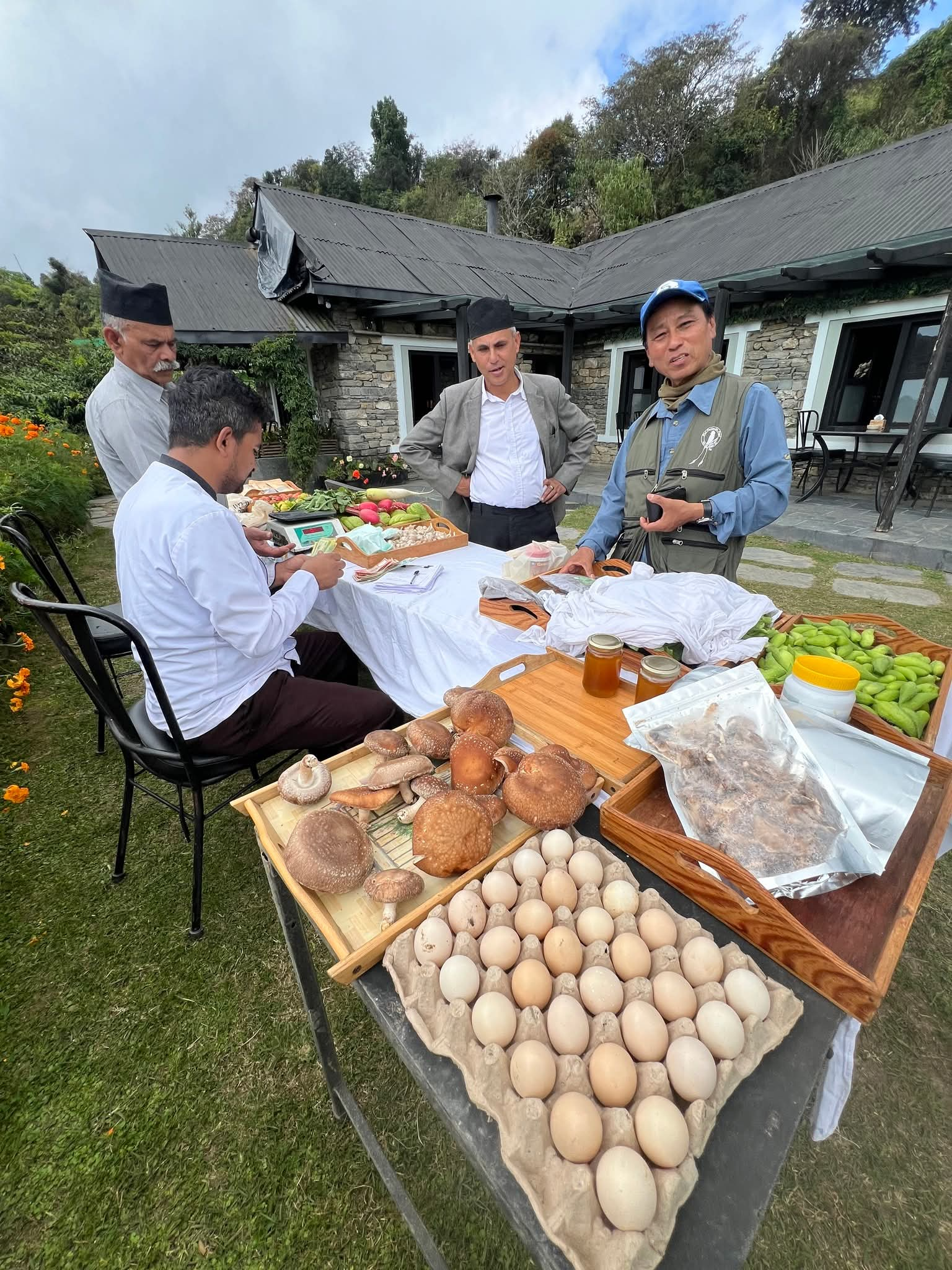
Prakriti’s culinary experience is being re-imagined around vegan and plant-based cuisine, rooted in seasonal, organic ingredients sourced from the resort’s farm and neighboring villages. Arun sees ethical food choices as an extension of
regenerative living-supporting health, environmental stewardship, and compassion. Guests are invited to experience the richness of plant-based meals that nourish both body and planet. Looking ahead, Arun envisions Prakriti Resort as a living, evolving model of holistic regeneration-where environmental restoration, cultural preservation, personal wellness, and community growth coexist in harmony. For him, this is not simply a hospitality venture but a lifelong journey-an invitation to co-create a future where tourism heals, connects, and uplifts all those it touches.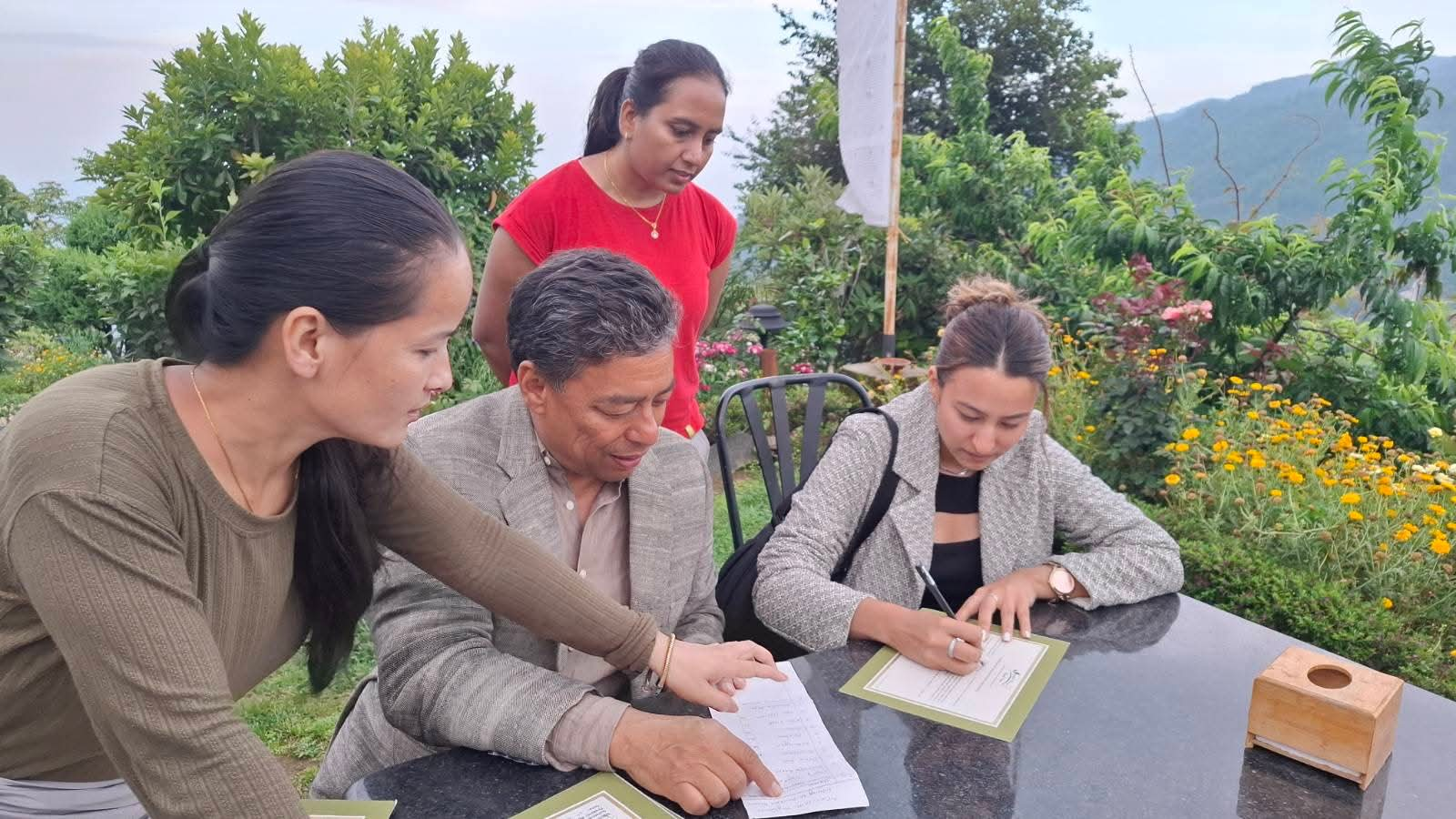
As part of his commitment to expanding the regenerative mission of Prakriti Resort, Arun is currently attending an important Regenerative Tourism Forum organized by the Government of Bhutan. The forum brings together global thought leaders, policy makers, and change makers working at the intersection of tourism, climate action, and community well-being. Arun sees this as a valuable opportunity to deepen his understanding, share Prakriti’s regenerative tourism model, and build connections with like-minded enterprises.
The forum focuses on practical frameworks like carbon footprint measurement, nature-based solutions, and regenerative travel practices that not only sustain but actively restore both people and the planet. Arun hopes that through this exchange, Prakriti can tap into a wider global niche market of sustainable and regenerative travelers, positioning the resort as a climate-conscious destination aligned with the values of restoration, wellness, and community upliftment. That next chapter began to unfold at the recent Travelife certification pressconference, where his daughter, Shreeyani Shrestha, stepped in as Master of Ceremony-marking her entry as the third generation in tourism. With grace, confidence, and a deep understanding of the resort’s values, she took on an active role in shaping the next phase of the journey.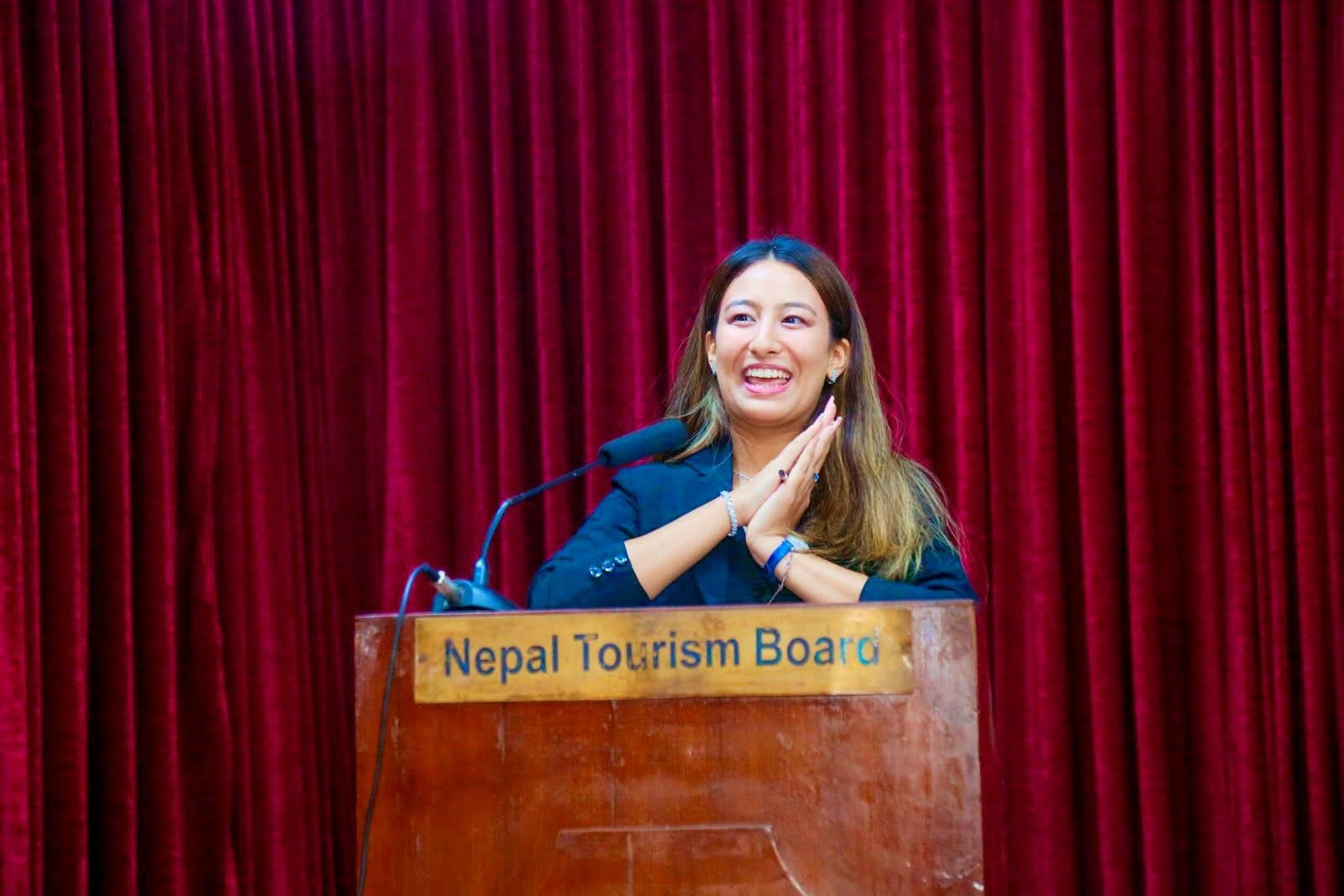
Her commitment is not only to uphold what has been built but to scale it forward-to refine and amplify the concept of regenerative tourism and expand Prakriti’s presence in the global market.For Arun, watching Shreeyani step into leadership was more than a proud moment-it was a signal that the mission lives on, renewed with fresh energy, purpose, and global ambition.
Editorial Perception
Prakriti Resort & Organic Farm proves that tourism in Nepal can be a regenerative force - boosting the economy, restoring culture, and protecting the environment. Its model, built on regenerative agriculture, eco-conscious design, zero-waste practices, and community empowerment, shows that profitability and responsibility go hand in hand. If adopted nationwide, this approach could make Nepal a global leader in tourism that regenerates rather than depletes. Once embraced on a larger scale, it will also drive a surge in business flow as the world increasingly seeks destinations that embody these values.